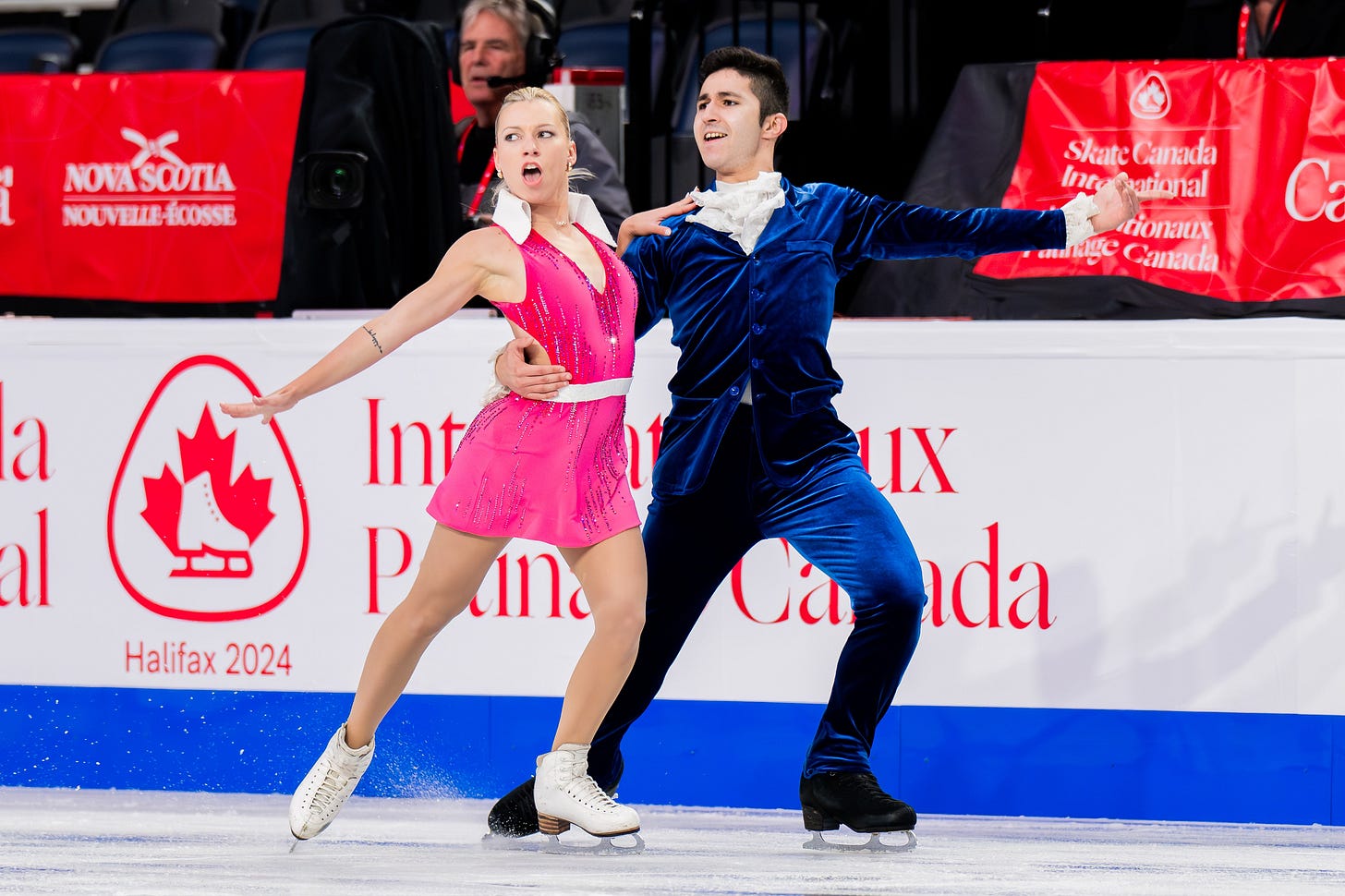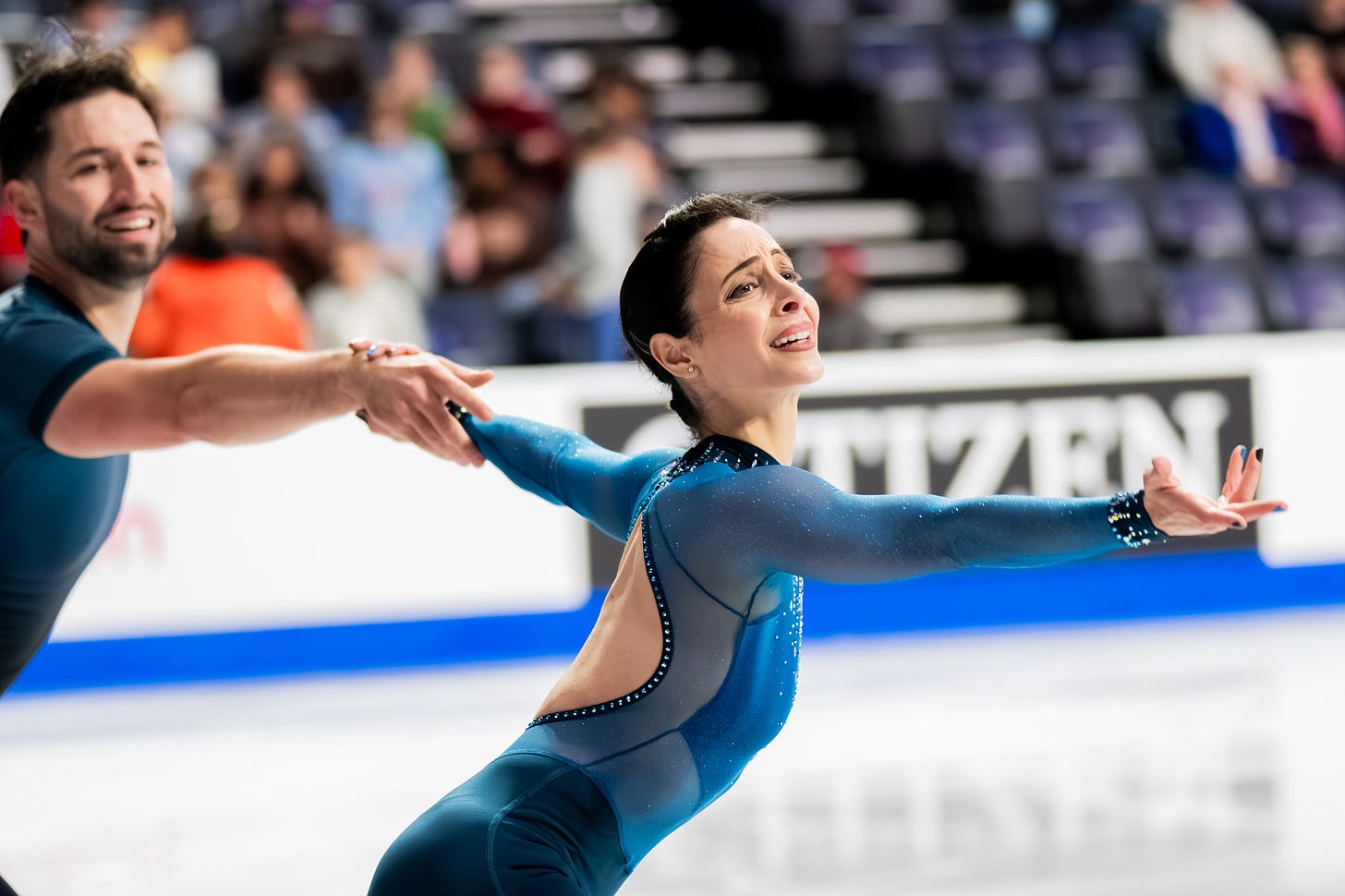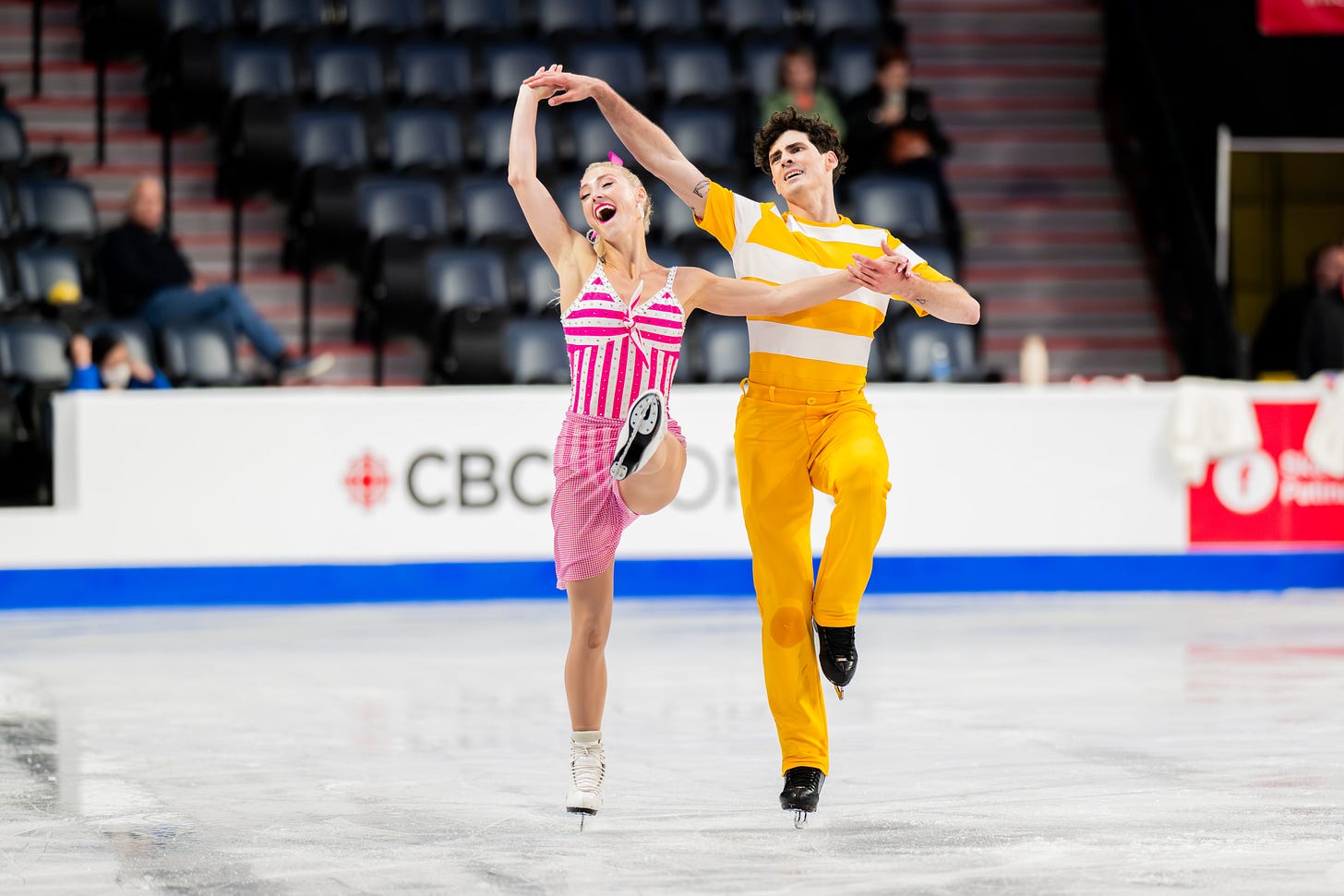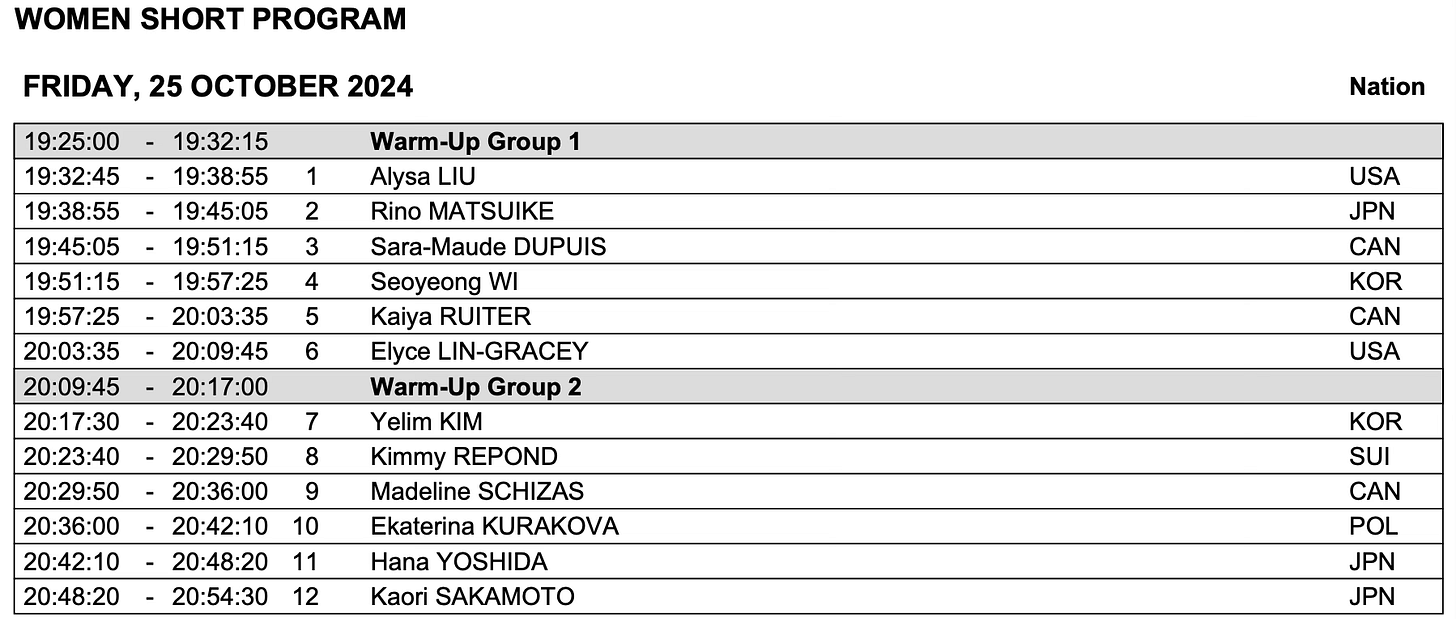#SCI24: 'I can't have a concussion after this'
A freak accident in training brought back bad memories (and symptoms) for Canadian ice dancer Marjorie Lajoie. But she's now '100 per cent' and ready to compete in Halifax.

HALIFAX — “Oh no, not again.”
Majorie Lajoie got that spooky feeling in early September, just a week after Skate Canada’s high-performance camp, when she learned an accidental collision in practice had left her with a second concussion. And all the bad symptoms she’d endured at the beginning of this year began to surface again.
“Everything. The light, the sound, you’re tired, headaches,” she said of what she started to feel the day after partner Zachary Lagha accidentally elbowed her in the head with they were practising twizzles at their International Academy of Montreal training base. “It’s all the symptoms pretty much. It’s pretty bad at the beginning. The first couple days, you’re just like ‘I can’t do anything’ … It’s pretty bad, because the brain shuts down and everything is disturbing your brain. So you need to rest, and that’s what I did.”
Fortunately for the 23-year-old Lajoie, the fog began to lift much more rapidly than back in January (she noticed it had far less impact on her speech), when she and Lagha had to drop out of both the Canadian and Four Continents Championships, with Lajoie not getting the go-ahead to compete at the World Championships in Montreal until just a few weeks before the event.
“When I had the one before nationals, that (recovery) was really long. The second one was less of a big deal and it was a lot faster, and now I’m a hundred per cent,” she declared Thursday at Scotiabank Centre, where they are set to compete at Skate Canada International, this country’s annual event on the Grand Prix Series (it traditionally slots in right after Skate America).
But still, she couldn’t help getting that feeling of dread about it all after what she had endured in the run-up to 2024 Worlds.
“The other one, it took almost two days before I had the symptoms. This one was a bit faster, it was the day after,” she explained. “When the symptoms appeared, I was like ‘oh, no.’ I can’t have a concussion after this, it was so stupid (“It wasn’t a hard hit,” Lagha said). It was just part of the transition. And right away, I didn’t feel it. Right away, I was like ‘oh my God, not again.’ But it happens. It’s the sport.”
On the plus side, this happened at a much earlier point in the season, when there is still plenty of time to catch up. But it did cost them the opportunity to compete at a pair of Challenger Series events (Nebelhorn Trophy and Budapest Trophy), and that means their season now starts this weekend.
“We wanted to do Budapest so we would have one competition before the Grand Prix,” said Lagha. “But we (didn’t do) the first run-through until the day before the actual competition.”
Added Lajoie: “And I still had symptoms, so I said we won’t push it. It was the right decision, and now I’m 100 per cent.”
Lajoie estimates they missed two full weeks of training in the wake of the concussion, and her return to the ice after that was slow and deliberate (something her recovery from the first one no doubt taught her).
“The way we trained, I couldn’t do 3 1/2 hours on the ice. So we trained two 45 minute (sessions) or two one hour. It was just the last week that I kind of did full training,” she said. “That’s the main thing we changed, more the hours, and at the beginning I couldn’t turn. So we didn’t do twizzles and spins, but quickly after I could turn and we could do twizzles.”
Now they are here in Nova Scotia, with the rhythm dance to come Saturday followed by the free dance on Sunday. If all goes as it should, Lajoie and Lagha should be standing next to Canadian champions (and four-time SCI winners) Piper Gilles and Paul Poirier on the podium. They’re the two highest-ranked teams at this event based on 2024 Worlds, where Gilles and Poirier were the silver medallists and Lajoie and Lagha placed fifth.
On Skate Canada’s summer strategy …
One of the themes we’ve heard from a lot of Canadian skaters over the past few months was the requirement (or strong suggestion) by their sport’s governing body that they take part in at least one summer competition. It’s a strategy that appears to already be paying dividends, at least in the eyes of Skate Canada high performance director Mike Slipchuk.
“We didn’t want people showing up at their first international event and that was their first competition of the year. What we wanted to make sure is when they went to their first (autumn) event, wherever it is, they’ve had some events under their belt, they’ve had their elements looked at, they’ve gotten feedback on their programs,” he explained. “So when they go to those events, they’re able to achieve qualifying scores. We’ve seen that already. We sent two girls to Nice last week (for Trophy Metropole Cote d’Azur) and they both got qualifying scores for Four Continents (Fee-Ann Landry and Breken Brezden). We sent Uliana (Shiryaeva) to Kazakhstan, she got the qualifying scores for Worlds.
“They all did at least two summer events and we found at least 90 per cent of our team, if not more, competed in the summer. And we’re starting to see that they’re coming out and they’re ready. The season goes fast and when we get to this point in the year, there’s not many competitions left. Domestically, you have your Sectional championships and you have Challenge. That’s it. Any opportunity you have to get out and put those programs out is important.”
Two-time Canadian champion Maddie Schizas is someone who would surely agree. Schizas, who’s among the women’s field here at SCI, did Cranberry Cup in Boston in August and followed that up with two Challenger Series events, and plans to do Ontario Sectionals next month.
“We knew that we had to do a summer event — that was made clear to all of us on national team well ahead of the summer — and I was offered a second Challenger event in the fall and I decided to take it,” she said. “It’s about trying to build experience as we head into an important season.
“It’s just about getting out there early enough to be ready for the fall. Sometimes the summer just flies by and you’re not ready. So it was a conscious choice to get out there and compete early. Although all these didn’t go as I hoped they would, it’s kind of helped me build for the event this week … I’m really prepared because of it. I was prepared last year, but this year I just feel a little more calm.”
The early start also gives skaters more time to fix what’s not working, and that’s another part of this puzzle.
“If you show up in the summer and you don’t skate well and programs are rough, it’s a wakeup call and you have time to fix it. You come out now, it’s very hard now,” said Slipchuk. “If you want to put a new jump in the program or you want to put a new quad in, here’s where you do it. You don’t try it at Skate Canada. You try it at Ontario summer competition. So that was more the premise on it: let’s get out there. People have been getting out and competing; it’s not like they hadn’t in the past, but I did see more of an uptick this season.” And some early successes, to boot.
Building women’s depth
It was back in January in Calgary the Schizas’ long program collapse allowed Kaiya Ruiter to skate right past her to claim her first Canadian women’s title. But while there was some talk afterward about what it might mean for the country’s lone available women’s berth at 2024 Worlds, it wasn’t a long discussion. That’s because Schizas was the only Canadian women’s skater to have achieved the International Skating Union’s technical minimum score for Worlds in the short program (although it was the right decision to send Schizas regardless, at least in these eyes).
Fast forward to this season, and the technical requirement has changed — it’s now the total score produced by a skater’s best short and long program scores over a two-year period (the magic number for women is 90.00). And already, three Canadian women have the necessary number: Schizas, Shiryaeva and Sara-Maude Dupuis. Yes, you don’t see Ruiter’s name on that list, at least yet. But she’s got Skate Canada this weekend, plus Warsaw Cup in late November to get the job done (Ruiter’s current total is 5.15 points shy of 90).
But it’s certainly encouraging that a wider pool of candidates will be available to consider for the women’s berth at the all-important 2025 Worlds in Boston, which will determine the allocation of spots for the Milan-Cortina Games.
“I have a feeling that we have a nice group of younger skaters in the women coming up … over the next three or four years, you’re going to see a lot of depth coming out of there, which is good,” said Slipchuk. “Right now, (for worlds qualifying scores), we have Maddie, Sara-Maude and Uliana. Kaiya is just a bit short on it. We’ve got two more that got the Four Continents, with Breken and Fee-Ann last week. We’re getting more depth on that, too.”

Citizenship update
Her partner let the cat of the bag earlier this week in a French-language interview, but Deanna Stellato-Dudek expanded Thursday on the status of her application for Canadian citizenship — something that will be required for she and Maxime Deschamps to represent Canada at the 2026 Winter Olympics in Milan-Cortina, Italy.
“My citizenship attorney told me to start studying for the exam and they’ll contact me in three to four months to take it,” she said. “So I’m studying every day, because I have to pass on my first try. Otherwise, I get put back in the queue and then it could take months to take it again. So I have to pass it right away.”
That’s especially critical because there is one more step in the process — Stellato-Dudek needs a Canadian passport for Olympic purposes, and there’s another wait time involved there (as anyone who has applied for a passport no doubt knows). “All the processing for this stuff takes so long,” she said. “I need the passport in hand, because you need to write that information down on the form (for Olympic eligibility).”
The good news, as they say, is that the light at the end of this tunnel is getting brighter. And that’s good news for the reigning world pairs champions, who skate their short program Friday night here in Halifax.

Changing their look
You won’t be able to miss Piper Gilles and Paul Poirier at SCI this weekend. They’ll be the ice dancers wearing the costumes that are … well, the picture above tells the story.
“We wanted to, because the music is Beach Boys and we’re living the California dream, we felt like what’s more California than Barbie and Ken?” said Gilles after trying them out in a front of practice audience filled with school children. “We’re calling this one ‘Barbie and Ken go to the beach.’”
Added Poirier: “We really wanted to have fun with this program and capture the carefree nature of the time … we wanted that to be reflected in the costumes as well.”
But here’s the thing. None of us know exactly if we’ll see these particular costumes again this season. That’s because Gilles and Poirier have multiple sets of costumes ready to go and plan to rotate them at events during the season. And fan reaction might play into which ones make the final cut for 2025 Worlds in Boston.
“We have four, but I have five of the same stuff. You’ll see,” explained Gilles. “It’s a wardrobe of Barbie and Ken and I think as the year goes on, we’ll have people telling us which ones are their favourites and it might be our consideration of what we wear at Worlds or Four Continents, which is kind of interactive with our fans. It’s just something else that people can play into our rhythm dance this year.”
So, is there pink somewhere in each one of them?
“No, they’re not,” said Gilles. “But we’re not going to give it away. We’ll see as the week goes on because they’re going to shuffle through. It’ll be a guess as to which ones we come out with.”
When to watch
For your viewing information, the start times for Friday’s events. All times are Atlantic (one hour ahead of Eastern):
That’s one golden ‘life raft’
I’ll never the look of excitement and just general giddiness that Patrick Chan felt at the medal ceremony for the Team Event at the 2018 PyeongChang Winter Olympics. Now this is a guy who won three World championships, 10 Canadian titles, took home a pair of silver medals from the 2014 Sochi Games — and yet I’d never seen the level of elation I saw four years later.
Sure, that gold medal in PyeongChang was thrilling enough and an absolute career highlight. But as he related to me during his retirement press conference months later, it wasn’t just about that — it was about being able to do it with some of his best friends in skating that made it extra special.
That thought came to mind on Wednesday, when Chan was inducted into the Canadian Sports Hall of Fame and his acceptance speech included an anecdote about how close he came to not having any of that happen. And the role his wife, Liz Putnam, played in changing his story — something he spoke about with immense gratitude.
“Most people don’t know this, but four months before the 2018 Games, I almost pulled the plug on skating. I was training in the U.S., I was so burnt out and one day I just stopped practising and flew to Vancouver to see Liz with no plan for what was next. I was in a dark place,” Chan revealed. “I remember people calling … Skate Canada, Scott Moir, Eric Radford, Mike Slipchuk. They were positive but obviously concerned. Somehow, Liz knew exactly how to handle that very delicate situation. She never pushed me, she just helped me clear my mind so I could decide what was best for my future. She was a life raft in that moment and if not for her, there would be no 2018 Olympics and no Olympic gold.”
That’s some pretty heavy stuff to digest. But it’s just another example of that old saying “you never know what someone is going through.” It’s also why we should all be so lucky to someone like Putnam in our lives. The right person to keep us on the path to happier days (and great moments) ahead.
Around the boards
While CBC has Anastasia Bucsis on site at Scotiabank Centre to conduct athlete interviews during the competition, its commentary team of Brenda Irving, Kurt Browning and Carol Lane will work the event from CBC’s studio in downtown Toronto. As we mentioned previously, the public broadcaster will have some live television coverage of Skate Canada International on Saturday and Sunday afternoons. Everything will be streamed live on CBC Gem and at cbcsports.ca … There’s been a lot of buzz already this season about the International Skating Union’s decision to allow backflips in competitive programs (previously, it was a two-point deduction). Asked Thursday if she’d consider trying one in a program someday, Canadian women’s champion Kaiya Ruiter didn’t hesitate. “Absolutely, I would,” she said. “I’ve been wanting to learn one. I’ve always wanted to learn one, because I did gymnastics as a kid and I always loved flipping backwards. So I’ve always wanted to, even just for a show … but now that it’s in the rules, go for it. I want to learn one one day. That’s definitely on my bucket list.”





